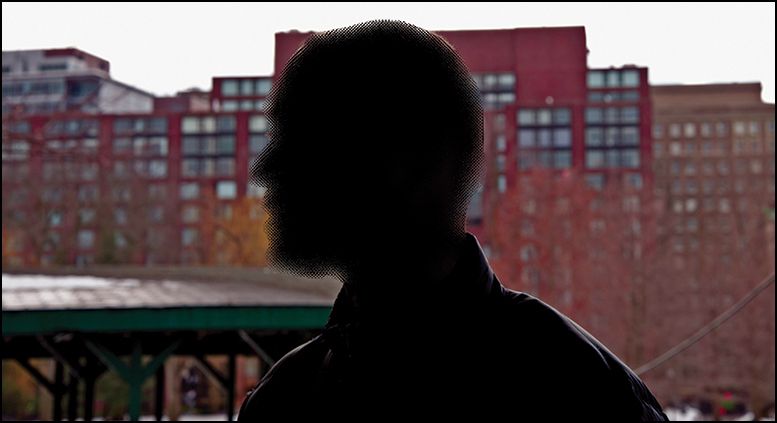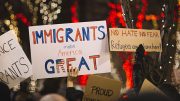By: Michael Givens/TRT Assistant Editor—
Two flags adorn one of the walls of Mohamed’s bedroom in his Boston-area apartment. The American flag gave him a sense of hope and security, unlike the flag of his home country. The rainbow flag was an affirmation of living in a nation that was much more accepting of an openly-gay man such as himself. The path that lead him to proudly display these two flags in his home was often fraught with anxiety, fear, and a deep-seated struggle with his ethnic and sexual identities.
“ … every time I have nightmares, especially with what’s happening in Syria, when I wake up and see the American flag and the rainbow flag, I feel like, ‘Okay, I’m here’,” he said with a sigh. “In Syria, you cannot really be out. The more exposure you have, the more risk you have. It doesn’t make sense to be out.”
On March 11, 2010, Mohamed, who asked not be identified by his real name, graduated with a degree in art and literature from Al-Baath University in Syria. On March 31, Mohamed flew to Qatar, a country nearly 1,000 miles southeast of Syria for a job opportunity. March 31 was also the day that Mohamed was mandated to register for two years of army service with the Syrian government.
Having been outed to a member of his conservative Muslim family and fearing that he could either be incarcerated for his sexual orientation—a crime punishable by up to three years in prison—or conscripted into the army, Mohamed said he was thankful to receive the job offer in Qatar.
“I wanted to be somewhere where no one knew me,” he said. “I didn’t even check the salary, the job title, or the company.”
In March of 2011, the Arab Spring, a series of pro-democracy protests across several Middle Eastern countries, had begun to foment political discontent amongst Syrians living under the presidency of Bashar al-Assad.
Seeking to quell unrest, al-Assad ordered the Syrian army to execute hundreds of protesters. In July, several top military officers broke away from the government forming their own army to overthrow al-Assad and the country was soon in the midst of a civil war, one that has seen several factions arise as well as outside involvement from more than a dozen countries. The latest estimates have put the death toll at more than 450,000 people.
By October 2013, Mohamed had been living and working in Qatar for more than three years and said that he was uncertain as to whether his contract would be renewed. He hadn’t visited Syria in three years due to the war and decided to take a vacation.
Later that month, Mohamed arrived in Boston; it was his first time visiting the United States. The stress of learning that his contract might not be extended with his employer paired with the possibility he’d have to return to Syria when his work visa expired lead him to apply for asylum.
“I can’t imagine going back there,” he said, noting that he learned through the application process that he could apply for asylum based on his sexual orientation and fear of being persecuted in his home country.
In early January 2014, Mohamed applied for asylum, and as of February 2017, he has not been granted a hearing on his application. In January 2017, he applied to have his Employment Authorization Document (EAD), a legal permit that allows him to work in the United States pending asylum, extended. His current EAD expires in May. He said he lives in fear that under the administration of President Donald Trump he could be deported back to Syria if his EAD is not renewed. A return to Syria would introduce Mohamed to the war and persecution for his sexual orientation.
“Violence is ongoing. The gay community is the most vulnerable community [when it comes to being] exposed to violence,” he said.
After President Trump enacted several strict immigration executive orders in late January, Mohamed’s fear of being deported increased dramatically. In the middle of the night, he said he awakes to see those two flags on his wall and the feelings of safety, acceptance, and security are no longer there.
“Now I have this anxiety again,” he said. “When I wake up and see the American flag, I do not feel comfortable. I don’t know what’s going to happen. It’s very scary.”
The Executive Orders
On January 25, President Trump signed Enhancing Public Safety in the Interior of the United States, an executive order limiting federal funds to so-called “sanctuary cities,” local municipalities that either through ordinance or resolution have pledged to not comply with federal civil detention policies for undocumented immigrants. The order also increased the number of Immigration and Customs Enforcement (ICE) officers by 10,000.
That same day, the President signed Border Security and Immigration Enforcement Improvements, an executive order upholding Trump’s controversial campaign promise to build a wall along the US-Mexico border.
Two days later, President Trump signed a third order, Protecting the Nation From Foreign Terrorist Entry Into the United States, which banned travel from seven countries with large Muslim populations including Somalia, Syria, Iraq, Iran, Libya, Sudan, and Yemen.
Protests rocked the country as activists decried the orders as racist, xenophobic, and Islamophobic. Attorneys descended on major airports to provide legal advice and support to people entering the country from these nations.
Within days of the executive orders being passed, a federal judge issued a ruling temporarily suspending the travel ban. Federal judges in the 9th Circuit Court of Appeals upheld the suspension. The Justice Department, which represents the President, will file arguments in the 9th Circuit court in response to a lawsuit filed by the state of Washington. Attorneys General from the District of Columbia and 15 states—including Massachusetts, Vermont, Rhode Island, and Connecticut—filed an amicus brief joining Washington in its lawsuit.
Numerous protests have been held to oppose the immigration ban and the President has taken an immense amount of criticism for signing the executive orders, including assertions that the actions are unconstitutional.
Massachusetts’ Reaction
Massachusetts Attorney General Maura Healey signed on to a lawsuit filed by the Massachusetts office of the American Civil Liberties Union (ACLU) and private attorneys against the President.
“Harm to our institutions, our citizens, and our businesses is harm to the Commonwealth of Massachusetts,” AG Healey said in a press statement. “The President’s executive order is a threat to our Constitution. Rather than protecting our national security, it stigmatizes those who would lawfully [immigrate] to our state. With this policy, our global universities, hospitals, businesses and start-ups, and far too many students and residents have been put at risk. On behalf of the Commonwealth, my office is challenging the immigration ban to hold this administration accountable for its un-American, discriminatory, and reckless decision-making.”
“A lot of what’s happened recently has been, in its verbiage, targeting folks from Muslim countries and specifically Muslim countries that are people of color countries,” said Carl Williams, a staff attorney for the Massachusetts chapter of the ACLU, about the perceived racism inherent in the executive orders. “No one said anything about Bosnia, no one said anything about Azerbaijan, about Muslim countries that are countries where white folks come from.”
Deferred Action for Childhood Arrivals (DACA), an executive resolution passed under the Obama administration, provides a path for young immigrants, under certain conditions, to legally live and work in the United States. The more than 750,000 estimated DACA beneficiaries, also known as “DREAMers” (for the Development, Relief, and Education for Alien Minors Act) have been able to secure legal documents, attend college, and hold jobs. However, under President Trump’s administration, this population of immigrants is highly at risk.
In early February, the arrest of a Seattle immigrant by federal authorities sparked national outrage. Daniel Medina, 23, was accused of having gang ties by ICE and immediately detained as a public safety threat though he had twice qualified for DREAMer status under former President Obama’s resolution.
“There is still not a lot of information on what will happen with DREAMers, and in that case we will have to fight alongside with them to ensure our universities are speaking up and those of us who are privileged enough to be citizens are showing up for immigrants across the board,” said Santiago Nariño, president of the College Democrats of Massachusetts (CDM).
On February 20, the President issued a memo providing protection for DACA recipients from deportation.
An immigrant from Colombia, Nariño said that the executive orders and Trump’s actions to secure the nation’s borders have had a personal effect on his loved ones.
“The executive orders … [have] put in danger some of my family members who are here with student visas and also who are completely undocumented,” he said. “His orders have psychologically taken me back to an era in my family’s history where we were afraid of Immigration and Customs Enforcement … coming to the door.”
Nariño said that he’s channeled that fear into helping immigrants to this country currently at risk of deportation.
“That is something I don’t wish for anybody and that is why I have built CDM on the basis of communicating and building bridges of knowledge for students and ensuring that those students are connected to the communities that are most affected by Trump’s policies.”
CDM has mobilized since the executive orders were issued and are involved in a range of projects with community-based organizations and elected officials to fight back against the President’s immigration policy.
“We want to make sure we are supporting the local community organizations like Cosecha and Student Immigrant Movement (simforus.org) as much as possible. We also are keeping in communication with SIM and other immigrant community groups to ensure we show up when deportation raids happen and we bring light and physically show up when we are needed.”
Other organizations across the Commonwealth have mobilized to support, advocate for, and protect immigrants, refugees, and asylees and several high-profile demonstrations have been held to protest increased federal deportation efforts.
“These executive orders have a chilling, paralyzing, and crippling impact on a large swath of the American Muslim community,” said John Robbins, executive director of the Council on American-Islamic Relations-Massachusetts (CAIR). “It’s difficult to overstate their negative impact on so many lives.”
LGBTQ People and Immigration
“I see Trump’s anti-immigrant propaganda as the continuation of the disenfranchisement that I, and many immigrants, especially refugees and asylees like me, have been suffering from for years,” said Pante-a, an Iranian asylee living in the Greater Boston area. “But now it feels like this administration is pressing the gas pedal all the way to the maximum speed, trying to get rid of us and making our lives harder than ever.”
Pante-a, who asked not to be identified by their real name, moved to the United States nearly 10 years ago on a student visa to pursue an undergraduate degree.
“In college, I came out as queer and after seeking legal counsel, I was strongly advised to seek asylum,” Pantea-a—who uses the pronouns they, them, and their—said. “I applied for asylum and was granted protection in the US. Currently, I hold a green card and am waiting to obtain my citizenship.”
Though they were able to secure their degree, college life was particularly stressful for Pante-a, who said that traveling outside of the country was nearly impossible.
“I finished my undergraduate studies unable to ever travel outside of the United States to see my family, or to attend a conference, or for any other personal or professional reason,” they said. “I was afraid that if I left, I would have to apply for another visa and the background check might take so long that I would miss a semester of college.”
Immigrants like Pante-a and Mohamed often face severe consequences if outed in their home countries, as do many other LGBTQ people in African and Middle Eastern countries. For example, OutRight Action International, co-authored a 2014 report on alleged human rights violations of LGBTQ Iraqi citizens, When Coming Out is a Death Sentence: Persecution of LGBT Iraqis.
“Past and present killing sprees against LGBT Iraqis have taken place with total impunity,” reads a section of the report. “No one has been held accountable for the murders, and the previous government rejected calls to even investigate violence based on actual or perceived sexual and gender non-conformity.”
The United Nations Refugee Agency prioritizes LGBTQ immigrants, refugees, and asylees in its work and in 2015 released a training manual for its employees on how to handle asylum-seekers fleeing sexual orientation or gender identity persecution.
Of the 11 million undocumented immigrants in the United States, more than 260,000 identify as LGBTQ, according to the National LGBTQ Task Force.
“Most immigrants, [especially] queer and trans refugees and asylees, are trauma survivors and experiencing this kind of treatment is retraumatizing,” Pante-a said. “In fact, Trump’s entire campaign and now presidency has been retraumatizing.”
An Act of Defiance
“I live in a town that voted for Trump,” said Pante-a. “Since Trump’s election I have felt very insecure and concerned if my neighbors or anyone who may know I am from Iran might give this information to the wrong person.
“I am paranoid to speak with people because of my accent. I have to deflect people’s question[s] when they ask where I am from. This [has] caused me to go out less and interact with fewer people. Since the inauguration, I am even more worried and careful.”
The term “sanctuary” has often been applied to jurisdictions enacting broad policies that limit local law enforcement from complying with federal immigration detention policies. At this time, rough estimates put the number of “sanctuary cities” in the nation between 200 and 300, however, the policies in place are often not uniform and have been passed through different legislative processes. For example, some mayors pass executive resolutions providing sanctuary status in their municipalities while other cities and towns pass local ordinances.
In Massachusetts—where there are more than a million foreign-born immigrants, according to the Migration Policy Institute (MPI)—there are eight municipalities with policies in place protecting immigrants: Amherst, Boston, Cambridge, Holyoke, Lawrence, Newton, Northampton, and Somerville. Several other cities and towns are in the process of codifying sanctuary language for their localities. To learn more about this issue, read Mass. cities and towns working to protect, support immigrants and refugees.
On a state level, Senator Jamie Eldridge (D-Acton) has filed SD.1596, An Act to protect the civil rights and safety of all Massachusetts residents.
“Massachusetts has a reputation for being a very welcoming state … I wanted to file legislation that really, beyond the legal protections, sent a very clear message to Muslims, to immigrants, that we were going to protect people who are here working hard, providing a better life for their kids, contributing to society and their community,” said Eldridge who said that he began work on drafting the bill after the November 8 election in anticipation of the President’s comments about immigration reform. “It limits the police from detaining an undocumented immigrant unless he or she has a serious criminal record [and prohibits] state resources from [being used for] a Muslim registry or any other registry based on ethnicity, national origin, or religion.”
The act will also ban local law enforcement agencies in Massachusetts from establishing collaboration agreements with federal authorities that would allow these agencies to carry out detention activities and will further ensure that, if detained, immigrants are given the right to due process and legal representation.
Representative Juana Matias (D-Lawrence) filed a similar bill in the House, HD.3052.
“Fortunately, our Founding Fathers had the foresight to design a system of government with shared powers,” said Matias. “The powers of the federal government are limited, and one of the ultimate checks on the federal government … is the 10th amendment, which provides that those powers not reserved for the federal government are reserved to the states. This bill is a stern reminder to the federal government that it is not the business of states and localities to regulate or enforce immigration law. [T]hat is the role of the federal government.”
In mid-February, Matias helped coordinate an immigration community forum in Lawrence.
“The immigration community forum featured an expert group of panelists … who are also prominent members of our coalition [and] explained the provisions contained within the executive orders, their implications, and the legal challenges that at the time were being presented in federal court,” said Matias, noting that roughly 300 people attended the forum. “We completed our forum with a ‘Know Your Rights’ presentation that was well received by the attendees.”
According to the representative, the event may be replicated in other areas of Massachusetts.
“Since the filing of our legislation and hosting the immigration community forum we have been fielding requests from our colleagues in the House who would like to have similar panels take place in their respective communities. It is critical that we continue to inform our residents and provide them with accurate information about their legal rights.”
Also known as the Safe Communities Act, the legislation was previously filed in the last two legislative sessions; both attempts at passing the legislation were unsuccessful.
Laws like the Safe Communities Act could go a long way in easing the fears of people like Pante-a and Mohamed.
“The day my asylum application was approved was the happiest day of my life. I could once again have some sense of security and stability in my life,” said Pante-a. “When I got my green card the nightmares stopped. I started making plans for my life and building a future here.
“And now, watching Trump rip away our rights and humanity with a signature, I see that even being a permanent resident isn’t good enough.”
In late February, Mohamed was mailed an acknowledgement that his EAD renewal application had been received. However, with President Trump’s intense efforts to ban immigrants from Muslim-majority countries, his anxiety is still running high. Mohamed has started thinking of what he would do should he be deported and has thought of moving to Canada even considering suicide as a last resort.
The Canada-US Safe Third Country Agreement went into effect in December 2004 and states that refugees fleeing persecution from their home country must seek asylum in the first safe country they land in, whether the United States or Canada. Because Mohamed arrived in the United States in 2013 and has already sought asylum here, he cannot apply for asylum in Canada.
“There’s no way I’d go back to Syria because the first day of my arrival they’d take me into the army and it’s a civil war and I don’t want to fight for [the Syrian] government,” he said. “I’m not a person who likes to be involved in any kind of violence.”
Pante-a said the negative stereotypes heaped upon immigrants need to be deconstructed.
“I also want to bust this idea of good immigrant [versus] bad immigrant,” they said. “Immigrants, like any other human being, shouldn’t have to fulfill a certain productivity test in order to be worthy of respect and rights.”
The Nightmare Continues …
Mohamed is waiting for a notice from the federal government, one that will inform him of the day and time for an interview to discuss his asylum application.
“Everyday I have this anxiety,” he said. “I check the mail, I wait for this letter to call me in for an interview. I just want to meet with them. And everyday my mailbox is empty.”
Though he loves the country and said that he believes in its values, he’s at a loss to explain the recent efforts at deporting thousands of immigrants.
“I came here to be treated with dignity and respect. I’m not asking for much,” he said. “I had a nightmare exactly when the civil war broke out in Syria.”
In the dream, Abdel said there’s an earthquake and the entire country is falling apart. There are train accidents and the infrastructure of Syria has completely crumbled. It’s a dream that he described as “horrific,” particularly since many of his family members still live there.
“When I wake up, the nightmare is not over. It’s ongoing,” he said.
[This story originally ran on the March 9, 2017 issue of TRT]






